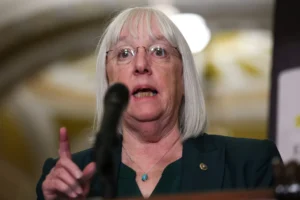A coalition of 22 Democratic-led states, civil rights organizations, and individual plaintiffs has filed multiple lawsuits challenging President Donald Trump’s controversial executive order to roll back birthright citizenship. The lawsuits, filed just a day after Trump’s inauguration, represent the first major legal confrontation of his presidency.
On Monday, Trump issued an executive order directing U.S. agencies to deny citizenship to children born in the U.S. if neither parent is a U.S. citizen or legal permanent resident. This move directly targets the 14th Amendment’s guarantee of citizenship to anyone born on U.S. soil, forming a key part of Trump’s broader immigration agenda.
The lawsuits, filed in federal courts in Boston, Seattle, and other jurisdictions, argue that the executive order is unconstitutional.
- Massachusetts Attorney General Andrea Joy Campbell stated, “If allowed to stand, Trump’s order would deny over 150,000 children born annually in the United States the right to citizenship. President Trump does not have the authority to take away constitutional rights.”
- New Jersey Attorney General Matthew Platkin added, “Today’s immediate lawsuit sends a clear message to the Trump administration that we will stand up for our residents and their basic constitutional rights.”
The lawsuits emphasize that denying citizenship would strip affected individuals of access to essential federal programs such as Medicaid, and the ability to work legally or vote upon reaching adulthood.
The legal pushback includes:
- 22 states, the District of Columbia, and San Francisco, filing jointly to block the order.
- The American Civil Liberties Union (ACLU), immigrant advocacy groups, and an expectant mother joining separate lawsuits.
- CASA, an immigrant rights organization, and several pregnant women filing a case in Maryland, including one plaintiff identified as “O. Doe,” a Temporary Protected Status (TPS) holder due to give birth in March.
- Seattle: U.S. District Judge John Coughenour will hear arguments on Thursday regarding a temporary restraining order.
- Massachusetts and New Hampshire: Three lawsuits filed, with appeals likely to be reviewed by the 1st U.S. Circuit Court of Appeals, composed entirely of Democratic appointees.
- Washington State: A case under the jurisdiction of the 9th U.S. Circuit Court of Appeals, historically known for its rulings on immigration issues.
Temporary Protected Status (TPS), a program that grants refuge to individuals from crisis-stricken nations, may also be affected. The U.S. currently hosts over one million TPS holders.
The White House has not responded to requests for comment, but these lawsuits mark the beginning of a prolonged legal battle over the constitutional and humanitarian implications of Trump’s immigration policies. Further cases challenging related measures are anticipated in the coming weeks.



























